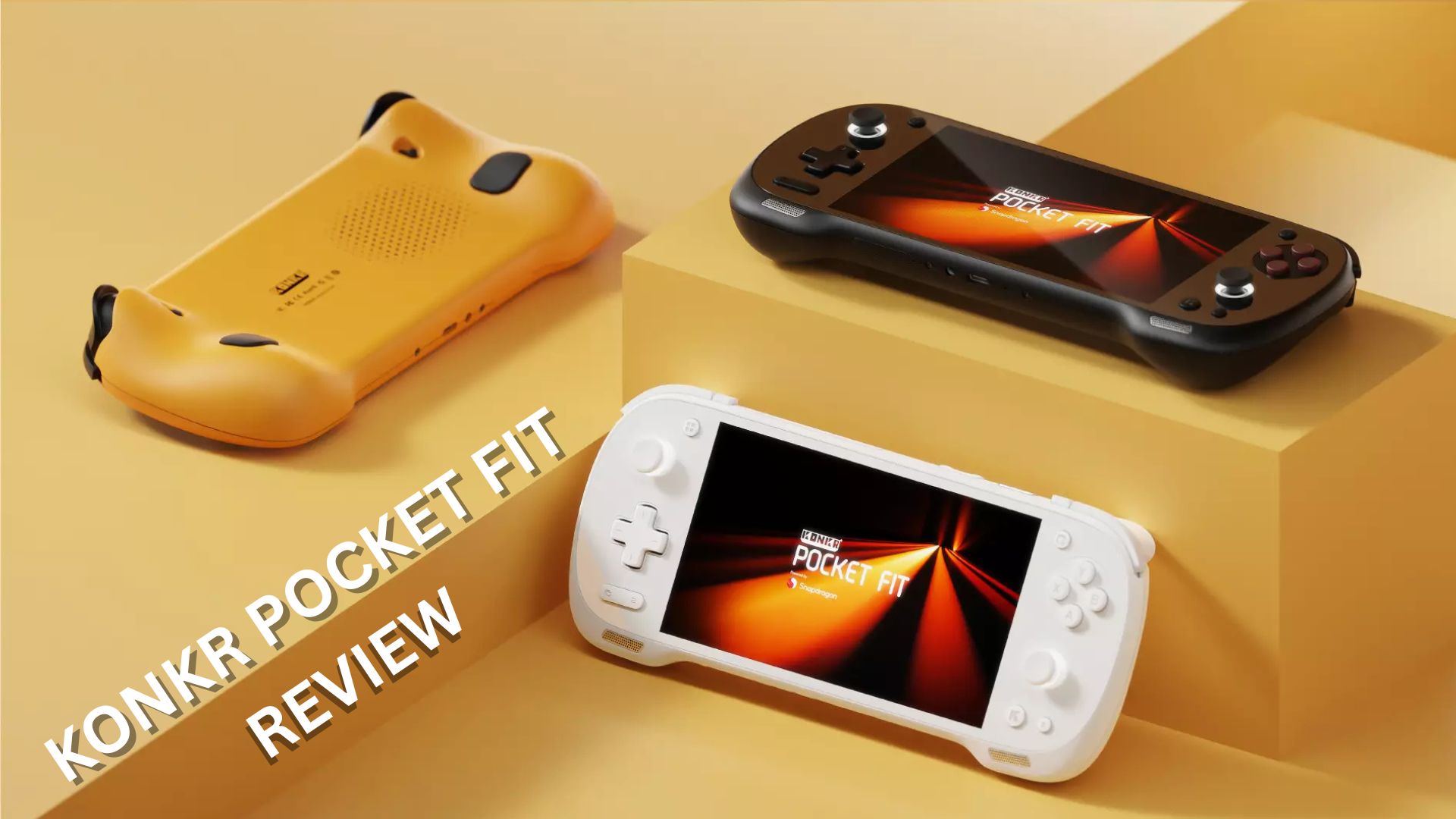KONKR Pocket FIT Review
-
Design
-
Build Quality
-
Display
-
Performance
-
Features
-
Software
Summary
By leveraging a top-tier Snapdragon processor and a high-refresh-rate screen in a value-focused design, the KONKR Pocket FIT makes truly high-end handheld gaming performance accessible without the premium price tag.
Pros
- Options of Snapdragon Gen 3 G3 or 8 Elite Flagship-Tier Performance processor for lower price
- AYANEO’s Full featured premium software
- 144Hz Refresh Rate Display
- Great emulation compatiblity
- Comfortable to play on
- Screen specifications may be contentious
Cons
- Screen specifications may be contentious
User Review
( votes)KONKR is the value-focused brand from the established Android & PC handheld maker AYANEO. In our comprehensive KONKR Pocket FIT review, we’ll explore how this more affordable Android gaming handheld stacks up against its premium-priced relatives.
KONKR Pocket FIT Review Video
KONKR Pocket FIT Overview
Our KONKR Pocket FIT review begins with an up-close inspection of the Android gaming handheld. The device’s dimensions are approximately 10 x 3.5 x 0.6 inches (22.5 x 8.89 x 1.7 cm), with the integrated grips increasing the thickness slightly to 1.1 inches (2.8 cm). It has a weight of about 386g (0.85lbs). The KONKR unit featured here is the Dragon Yellow variant; it is also set to be released in Phantom Black and Snow White.
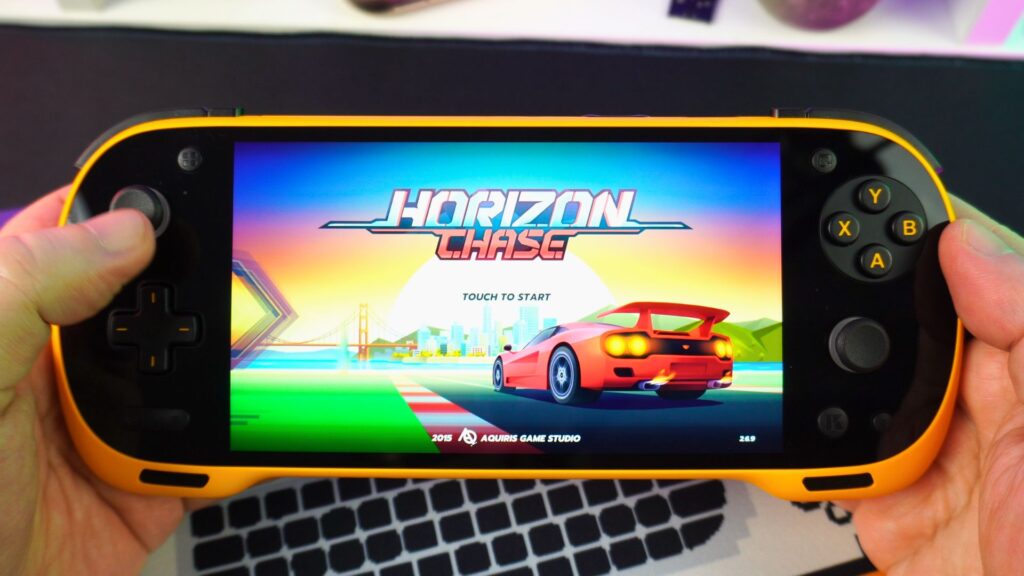
The face of the device is dominated by its 6-inch LCD touchscreen, which features a 1920×1080 resolution and a refresh rate of up to 144Hz. A discernible difference can be seen when placed next to a high-end OLED panel, like the one on the AYANEO Pocket DS. However, for a device at this price point, some trade-offs are to be expected.
Flanking the display are the standard gaming inputs. This layout includes Hall effect joysticks, which have become a near-universal feature on modern Android gaming handhelds. Near the bottom, you’ll find two sets of buttons: one pair for SELECT & START, and another for quick access to the AYA Space overlay and the device’s home screen.
Along the bottom edge, there is a covered Micro SD card slot for expanding onboard storage. It’s accompanied by a 3.5mm headphone port and a USB 3.2 Gen 2 Type-C port, the latter of which handles both charging and video-out functionality when used with a compatible hub or adapter.
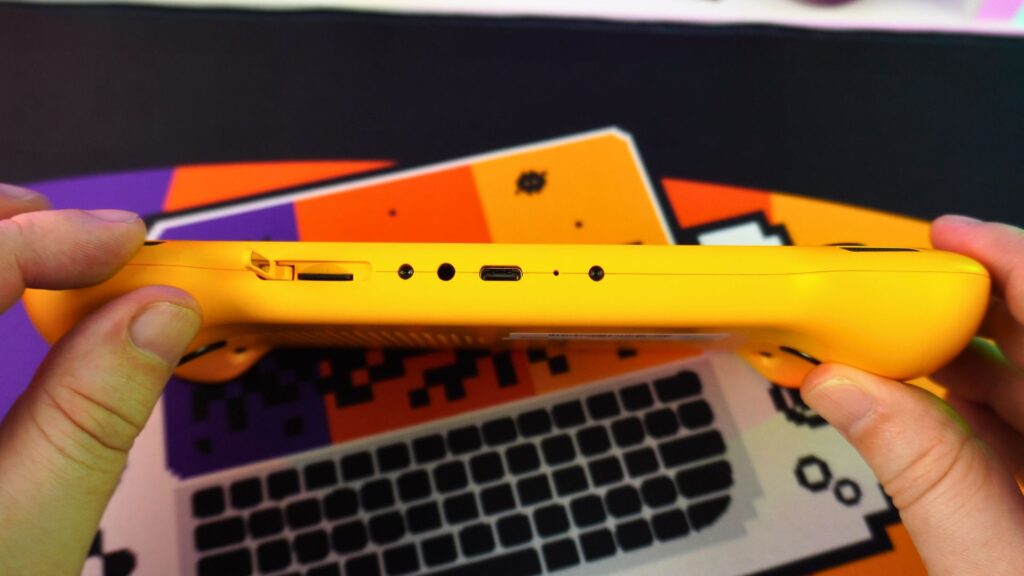
The top of the handheld is equipped with Left and Right Hall effect triggers, complete with switches to toggle between Analog and Digital modes, ideal for racing games and first-person shooters, respectively. Positioned slightly off-center are the volume rocker and power button.
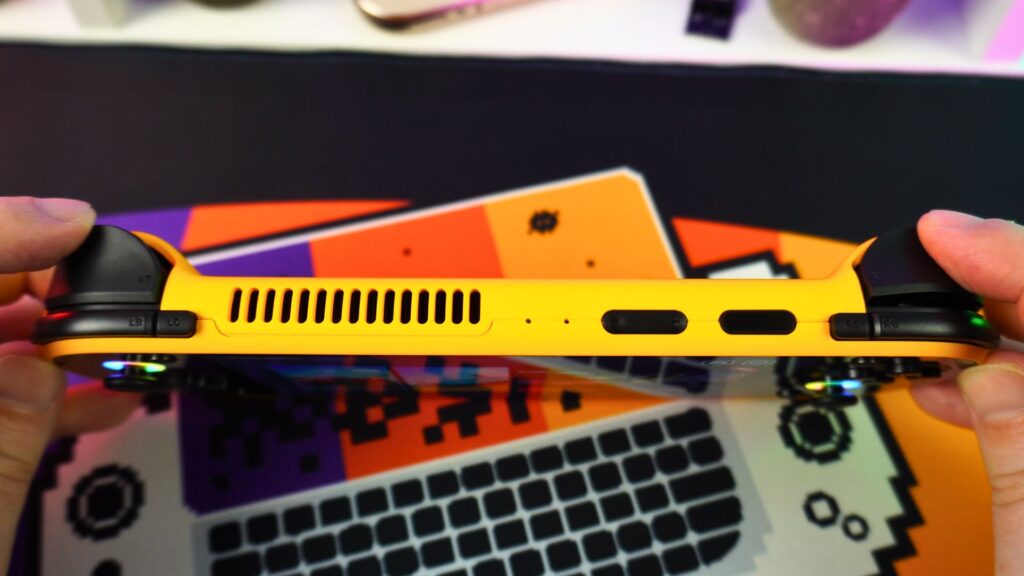
On the rear of the device, you’ll find two grip sections made of smooth, untextured plastic. There are also two macro buttons that can be customized via the included software. Finally, the switches that control the trigger modes are also located here.
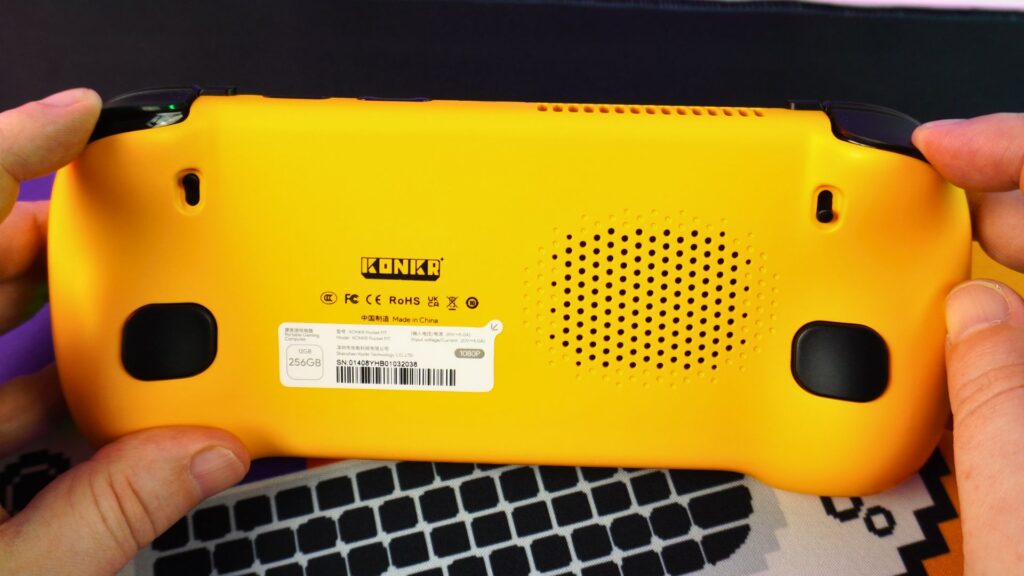
In terms of overall build quality and comfort, the device feels solid. The one minor critique is that the grips are somewhat too slick to provide a truly secure hold. Aesthetically, I find it quite striking, especially with the seamless all-glass front panel of the handheld.
KONKR Pocket FIT Technical Specifications
Continuing our KONKR Pocket FIT review, we’ll now examine the technical specifications, followed by our own performance evaluations covering battery longevity, fan acoustics, and thermal output.
| Feature | KONKR Pocket FIT G3 Gen 3 | KONKR Pocket FIT 8 Elite |
| Display Size | 6″ 1920 x 1080 144Hz LCD Display | 6″ 1920 x 1080 144Hz LCD Display |
| SoC | Qualcomm Snapdragon G3 Gen 3 Gaming Platform | Qualcomm Snapdragon 8 Elite |
| Storage | 8GB+128GB / 12GB+256GB / 16GB+512GB / 16GB+1TB | 8GB+128GB / 12GB+256GB / 16GB+512GB / 24GB+1TB |
| Flash | UFS 4.0 (128GB version uses UFS 3.1) | UFS 4.0 (128GB version uses UFS 3.1) |
| Memory | LPDDR5X | LPDDR5X |
| Cooling | Large cooling fan, Wide-area copper heatsink + cooling fins | Large cooling fan, Wide-area copper heatsink + cooling fins |
| Color Options | Phantom Black | Snow White | Dragon Yellow | Phantom Black | Snow White | Dragon Yellow |
| Controller | Master Controller with Xinput & Dinput Compatibility | Master Controller with Xinput & Dinput Compatibility |
| Joysticks | Mid-Sized Hall-Effect Joysticks with RGB Lighting | Mid-Sized Hall-Effect Joysticks with RGB Lighting |
| Triggers | Hall-Effect Triggers | Physical Linear & Digital Dual-mode | Hall-Effect Triggers | Physical Linear & Digital Dual-mode |
| Vibration | Dual x-axis linear motors | Dual x-axis linear motors |
| Gyroscope | 6-axis gyroscope | 6-axis gyroscope |
| Ports | 1x USB-C 3.0 Gen2 1x Micro SD, 3.5mm Headphone jack | 1x USB-C 3.0 Gen2, 1x Micro SD, 3.5mm Headphone jack |
| Special Features | Device Button Remapping, External Button Remapping | Per-Game Auto Profiles, Advanced Button Remapping |
| Connectivity | High-speed WiFi / Bluetooth 5.3 | High-speed WiFi / Bluetooth 6.0 |
| Battery | 8000mAh | 8000mAh |
| Charging | PD fast charging | PD fast charging |
| Size | 8.8 x 3.5 x 0.66 inches (22.5 x 8.89 x 1.7 cm) | 8.8 x 3.5 x 0.66 inches (22.5 x 8.89 x 1.7 cm) |
| Weight | 386g (0.85 lbs) | 386g (0.85 lbs) |
| Operating System | Android 14 | Android 16 |
For our battery longevity assessment, we looped the Antutu benchmark with the screen at maximum brightness and the device set to Max Performance mode. Under this heavy load, the 8000mAh battery lasted for approximately 2 hours and 33 minutes. Naturally, average battery life will be considerably longer; you can anticipate a solid 6 to 8 hours depending on the game being played.
During the battery endurance test, we simultaneously measured fan noise and heat levels. The fan reached a peak volume of 66dB, was nearly silent on average, and turned off completely in ECO mode. The highest temperature we recorded was about 48°C.
KONKR Pocket FIT Benchmarks
To provide a clear performance comparison for our KONKR Pocket FIT review, we conducted a suite of benchmarks and compared the results against other devices. Our comparison includes the previous-generation AYANEO Pocket ACE and Pocket S models, as well as the new-generation Pocket S2, which features the identical processor.
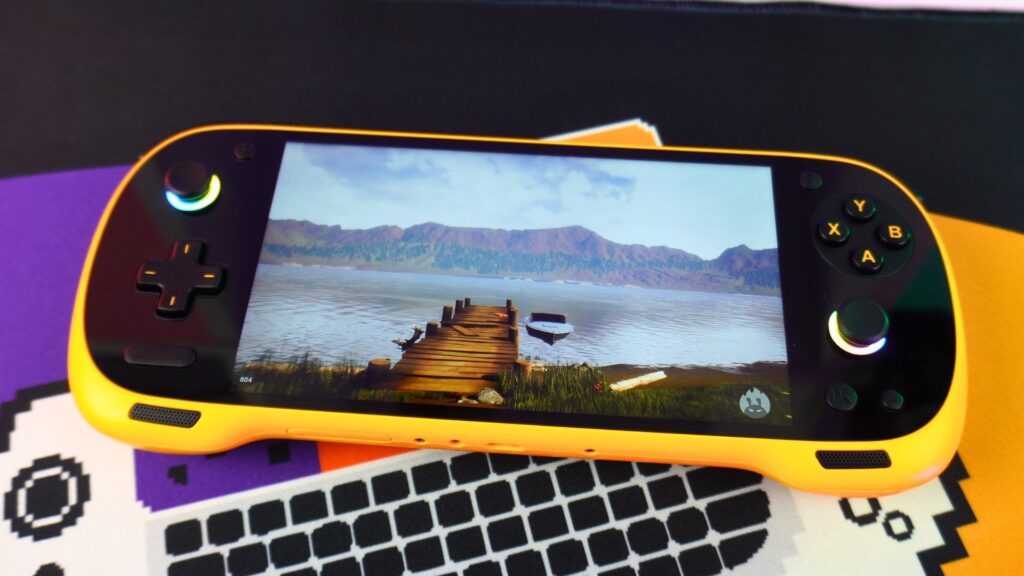
Antutu
Using Antutu, a popular tool for general Android benchmarking, the device achieved scores that were consistent with the Pocket S2, landing around the 2.1 million mark. Multiple runs would likely yield similar figures, placing any variance well within the margin of error.
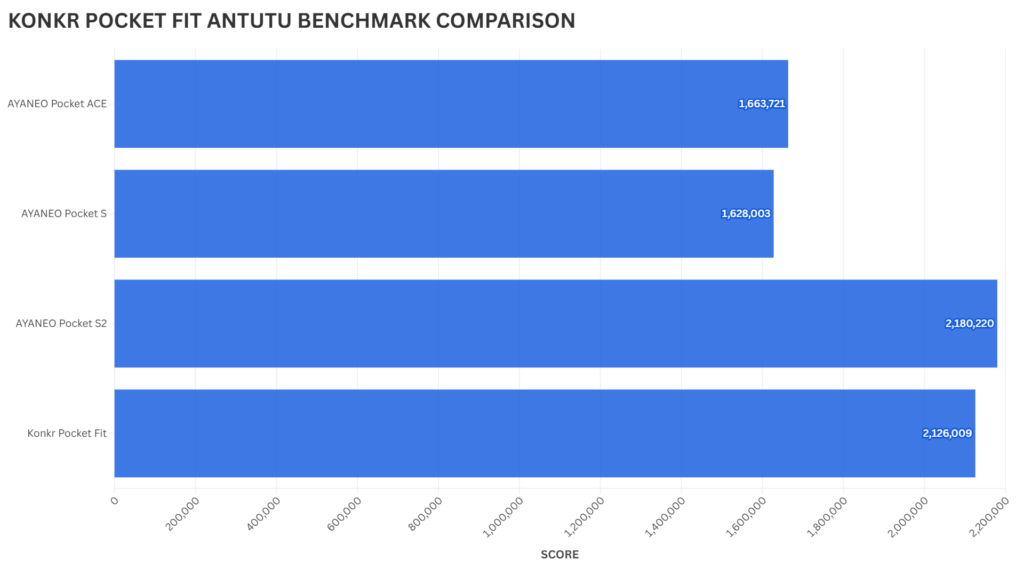
3DMark TimeSpy
In 3DMark’s Wildlife Extreme benchmark, the KONKR Pocket FIT once again posted impressive scores that were comparable to those of the AYANEO Pocket S2.
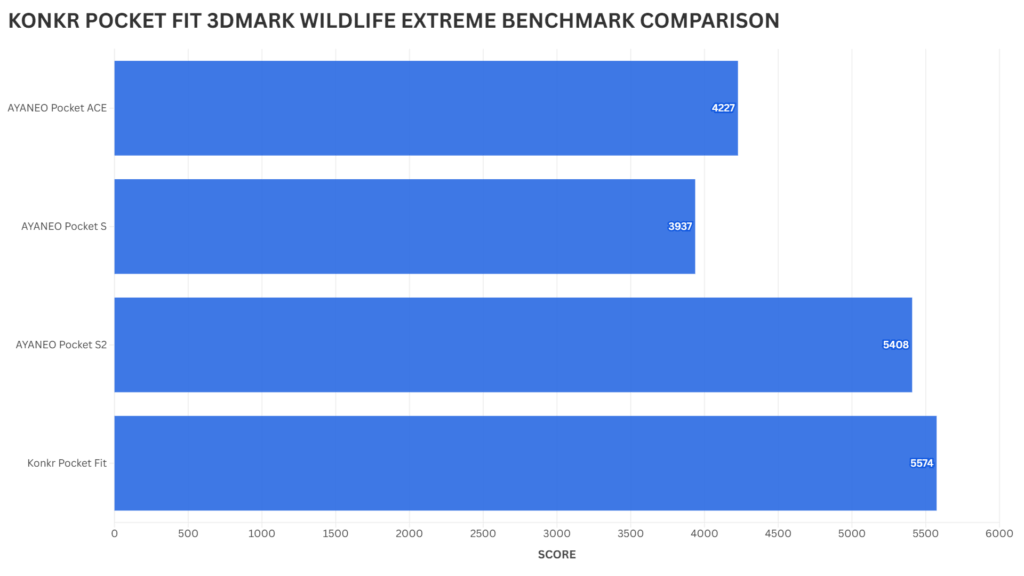
Geekbench 6
Likewise, in Geekbench 6, which evaluates the CPU’s single-core and multi-core capabilities, we observed virtually identical scores across both tests. All in all, it’s safe to say the performance is roughly equivalent to that of the premium AYANEO Pocket S2.
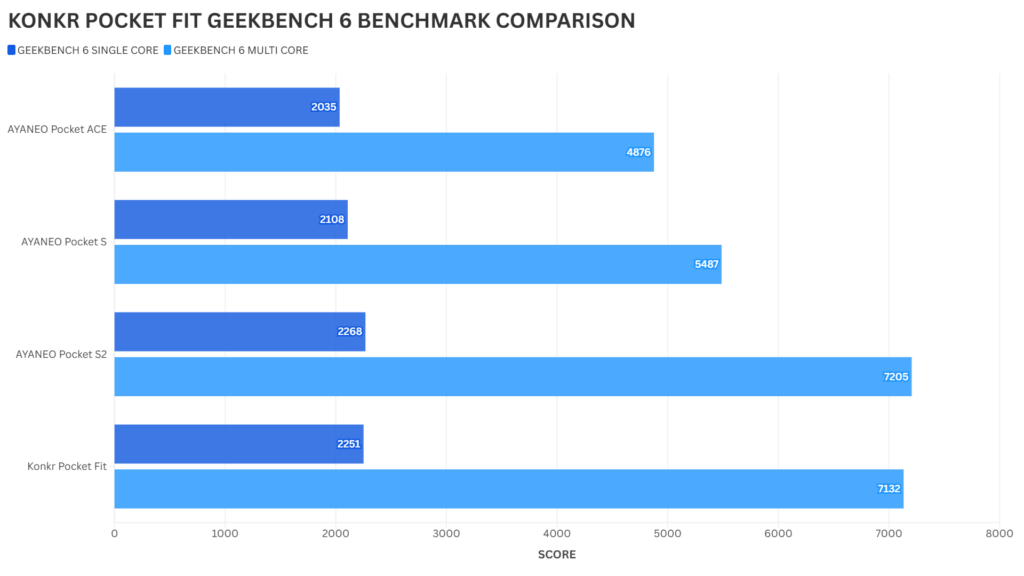
KONKR Pocket FIT Software Overview
The AYA Space application is a mature and well-regarded piece of software. Fortunately, the more deluxe experience typically reserved for AYANEO’s main line of Android consoles has been carried over to the KONKR Pocket FIT. You get the AYA Space application for organizing your ROMs and apps, plus AYA Settings for fine-tuning the device, including its performance profiles, controller settings, device spoofing, and firmware management.
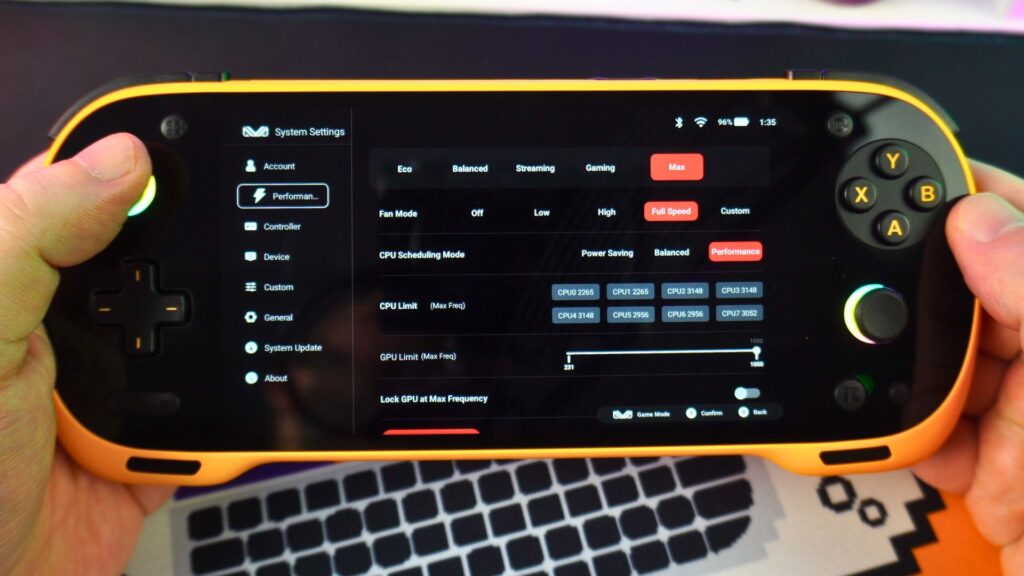
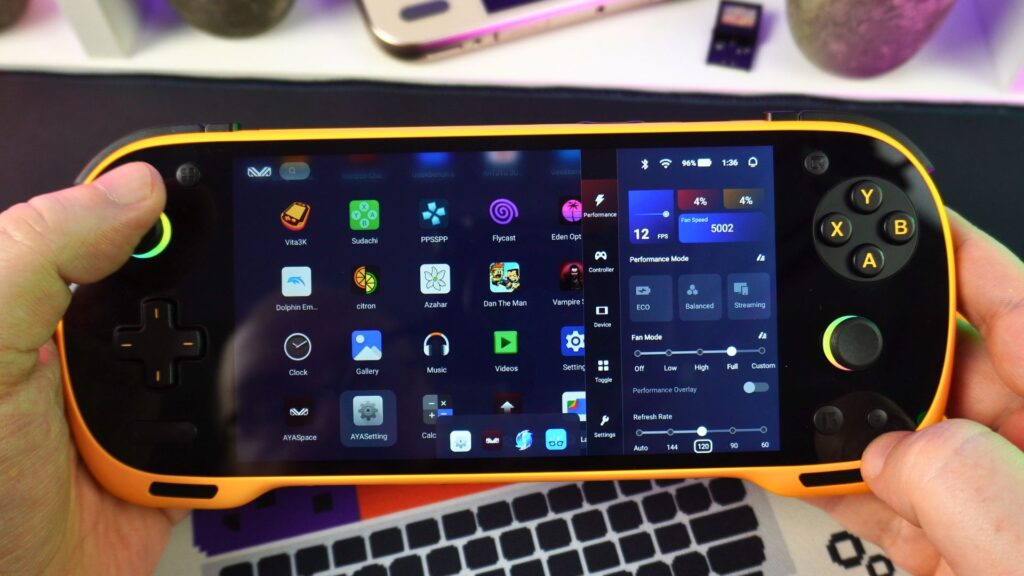
Additionally, the device includes the AYA Space overlay, providing shortcuts to frequently used settings like performance mode, controller configuration, screen adjustments, and on-screen controller mapping. The inclusion of this powerful software suite represents outstanding value for money in the budget handheld market, making the AYA software a major selling point.
Android Gaming
This section of our KONKR Pocket FIT review takes a quick look at native Android gaming. Having already reviewed the AYANEO Pocket S2, we know that this Gen 3 processor is capable of handling virtually any Android game you can throw at it. We tested a wide variety of titles, from the relatively simple Dan The Man to more graphically intensive games like Alien Isolation and Prince of Persia. We encountered absolutely no performance problems. You can even use the device spoofing feature to mimic a Xiaomi 15 Pro, which can unlock higher graphical options in certain games.
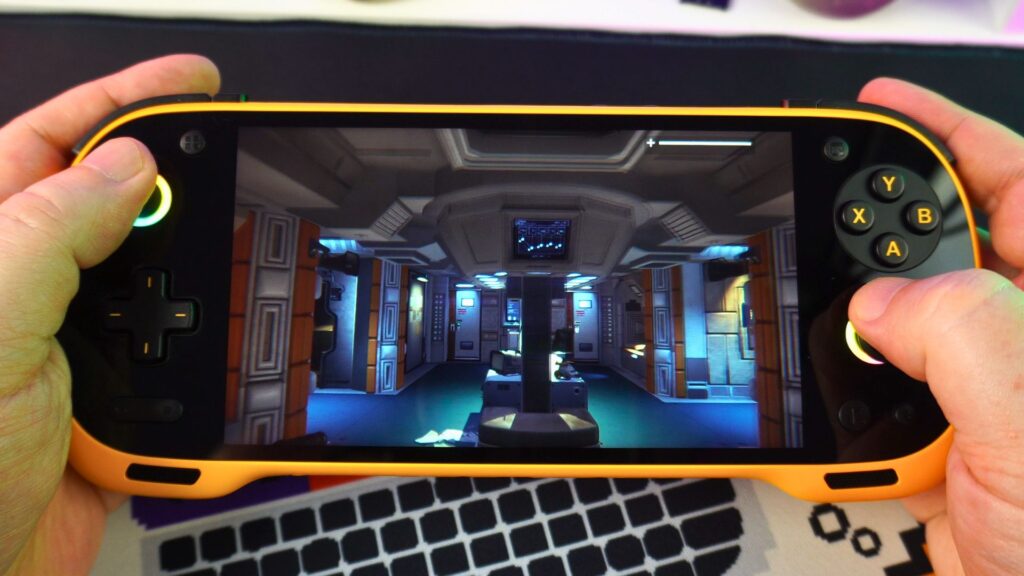
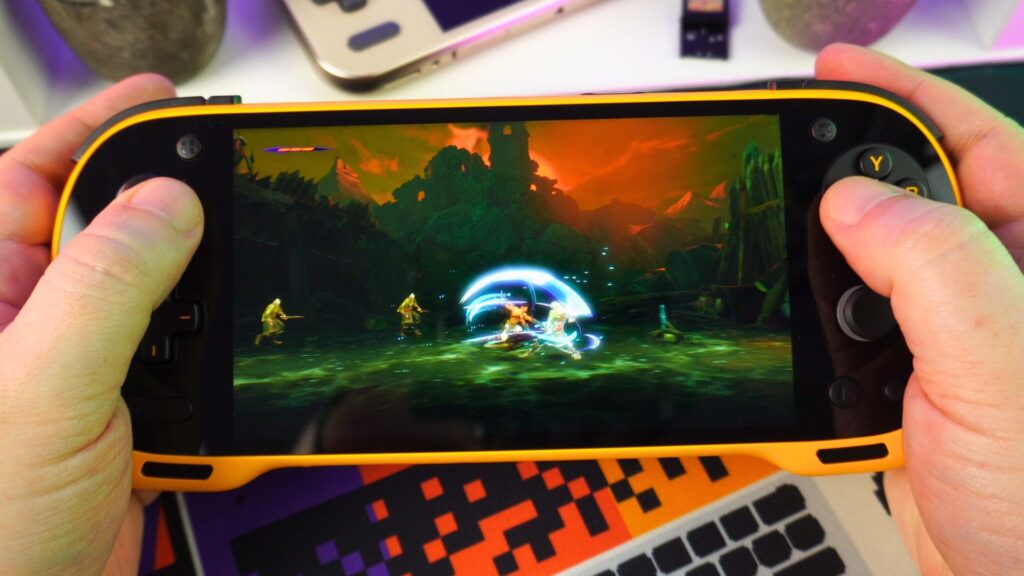
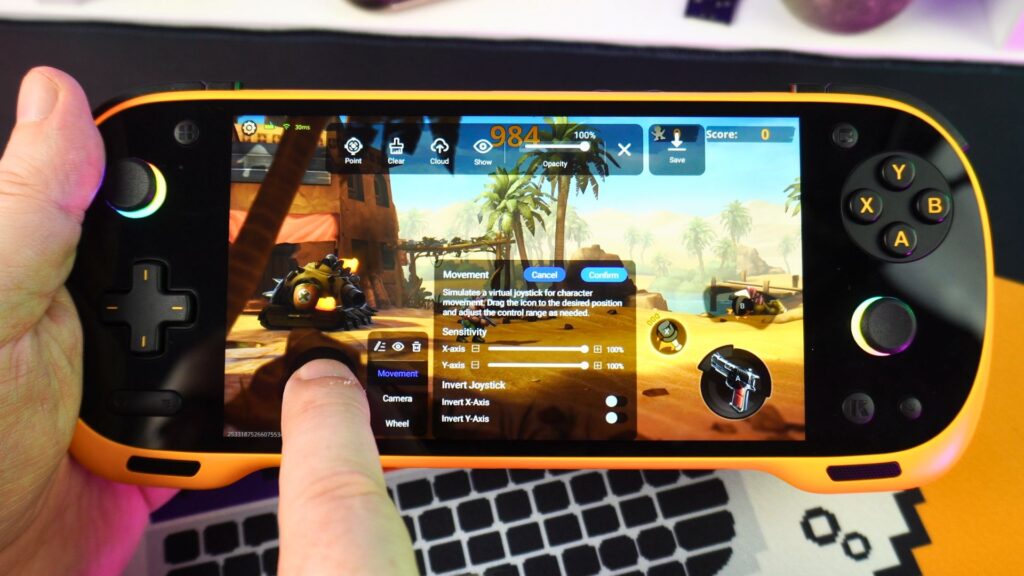
And, as expected, for titles that lack native controller support, you can utilize the screen mapping software to assign physical controls to on-screen touch inputs.
Emulation Gaming
The Gen 3 processor can comfortably run almost every emulator, up to and including the most resource-intensive ones, without any trouble. Every system from the 8-bit era all the way to the PS2 generation should operate perfectly, as long as the games themselves are compatible with the emulator. You also have the option to enhance the visuals by applying graphics tweaks, such as boosting the rendering resolution to 1080p or, in many instances, even 4K when connected to an external monitor. As part of our KONKR Pocket FIT review, let’s examine some of the more demanding emulators.
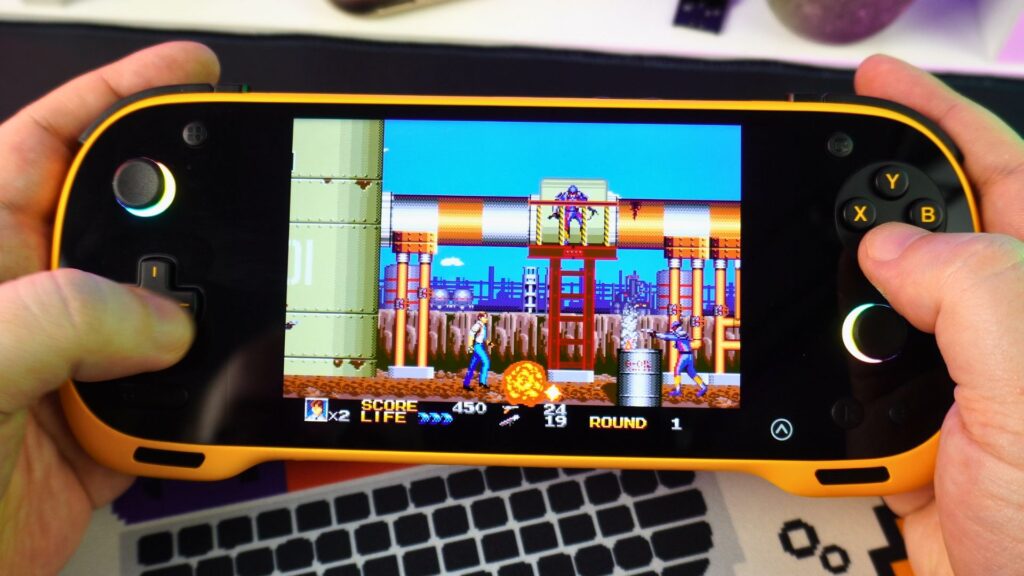
Azahar
In terms of performance, the dual-screen emulator Azahar runs flawlessly. It’s possible to increase the rendering resolution to 1080p and even higher when outputting to a 4K screen. While you might experience very infrequent, minor stutters due to shader cache generation in some games, it’s nothing that detracts from the gameplay.
Vita3K
The Vita emulator, Vita3K, performs exceptionally well on this CPU. With a few graphical adjustments, we were able to increase the rendering resolution to 2x on the device’s native display. Depending on the game’s demands, you can push this even higher when playing on a TV.
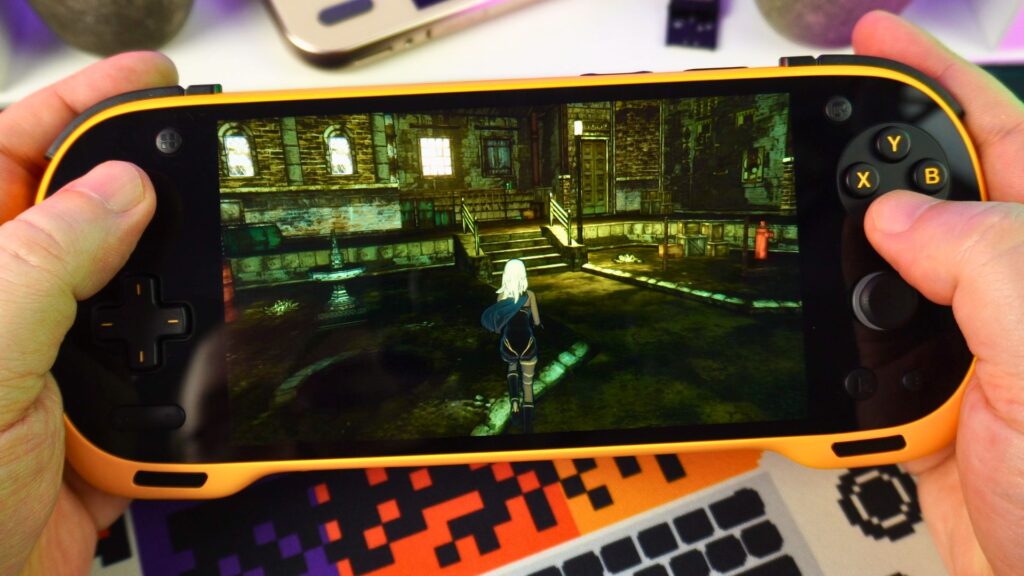
Eden
The Eden emulator has shown continuous improvement, and its current performance is quite remarkable. Games with low-to-mid-level demands should run very smoothly, and in most scenarios, you can achieve 60 FPS in docked mode. For certain first-party titles that we cannot name, the performance is very impressive, with popular action RPGs, for instance, running at very playable frame rates.
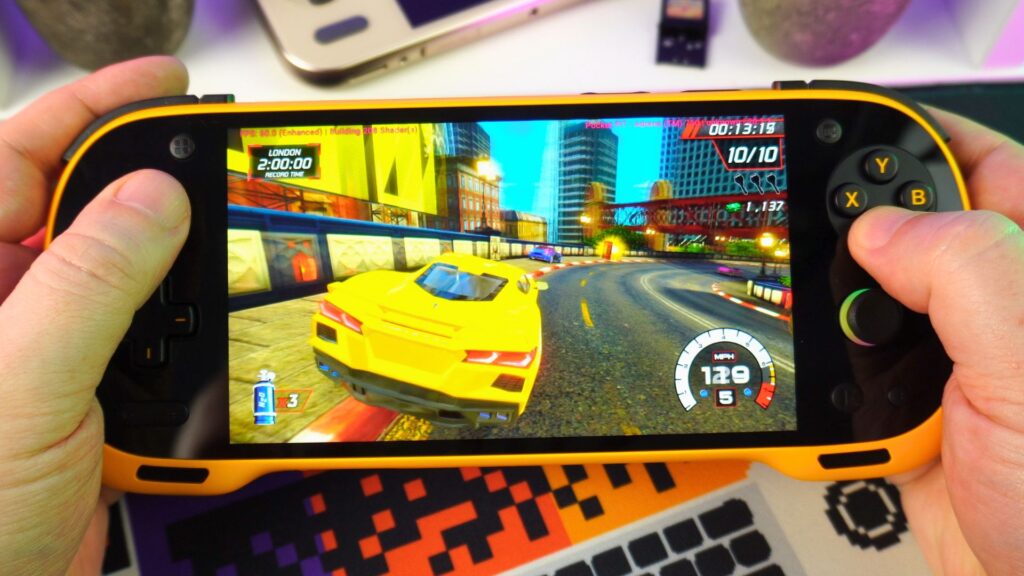
With the exception of the very newest PS3 emulator, which is still in its early developmental stages and has limited compatibility, you should encounter no difficulties running emulators on this Android gaming handheld.
Final Thoughts
It is now time to summarize our KONKR Pocket FIT review. In short, the KONKR Pocket FIT is an exceptional Android gaming handheld for those who are budget-conscious but still want a device with very high performance—and let’s be fair, high performance is something everyone wants.
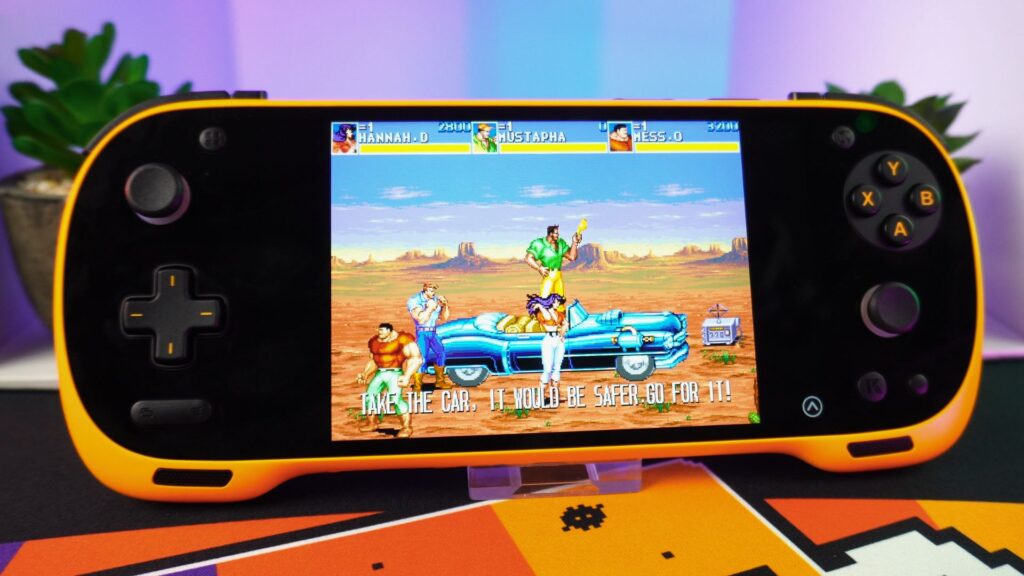
In our benchmarks, we observed top-tier scores that were on par with the premium AYANEO Pocket S2, which uses the same processor. When you factor in the price difference of roughly 58%, it represents an outstanding price-to-performance value.
The general feel of the KONKR Pocket FIT is pleasant, and the rear grips are a much-appreciated feature, albeit one that could benefit from some texturing. The absence of grips was a notable drawback for me on the S2, so in a direct comparison, the FIT has a clear advantage here.
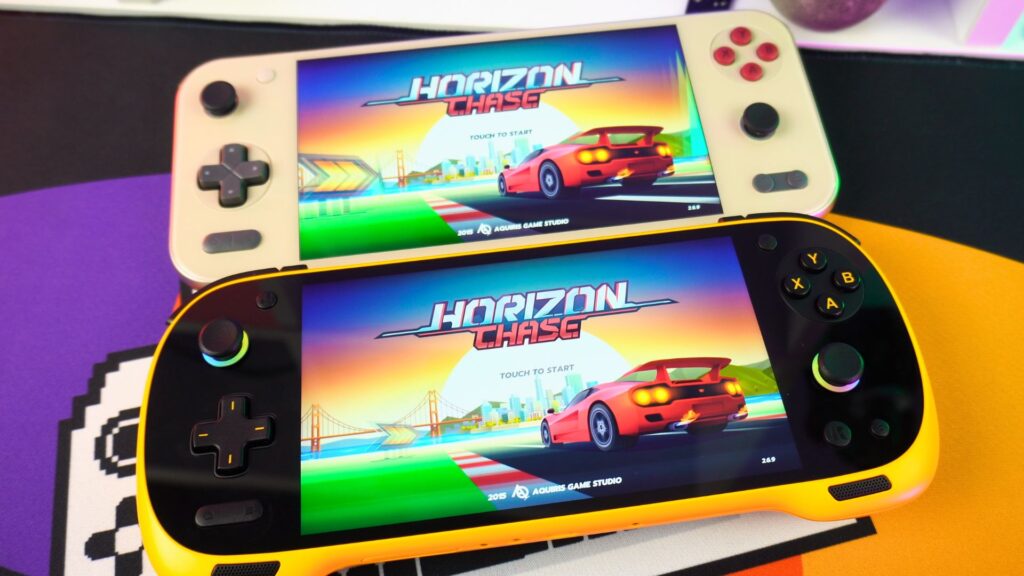
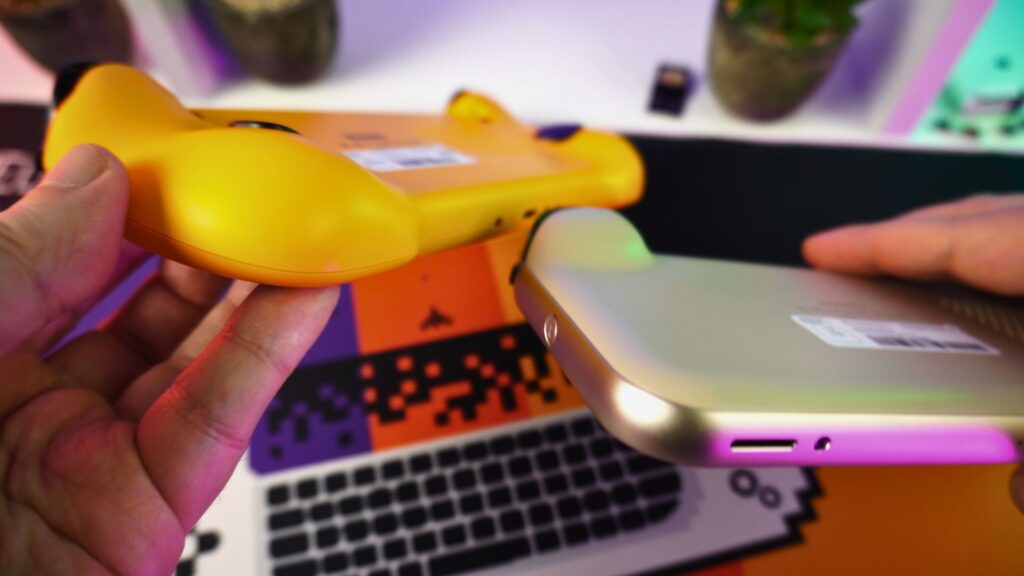
The screen is likely the most significant point of contrast. With the Pocket FIT, we have a 6” 1080p 144Hz LCD panel, whereas the S2 features a slightly larger 6.3” 1440p 60Hz IPS display. Each has its own set of advantages and disadvantages. When viewed side-by-side, the Pocket S2’s screen certainly appears more vibrant and supports a higher 1440p resolution, but it is limited to a 60Hz refresh rate, unlike the up to 144Hz on the KONKR Pocket FIT.
From my perspective, the KONKR Pocket FIT stands as a superb alternative to the premium AYANEO Pocket S2. It matches its counterpart in performance and comfort, while the build quality feels a step down, and the choice between the two displays is a matter of personal preference. If you are working with a limited budget, this handheld should be at the very top of your list.

KONKR Pocket FIT
That concludes our KONKR Pocket FIT review, we hope that you have enjoyed it. What are your thoughts on the Pocket FIT, does the premium performance at a budget price interest you? Let us know in the comments!

